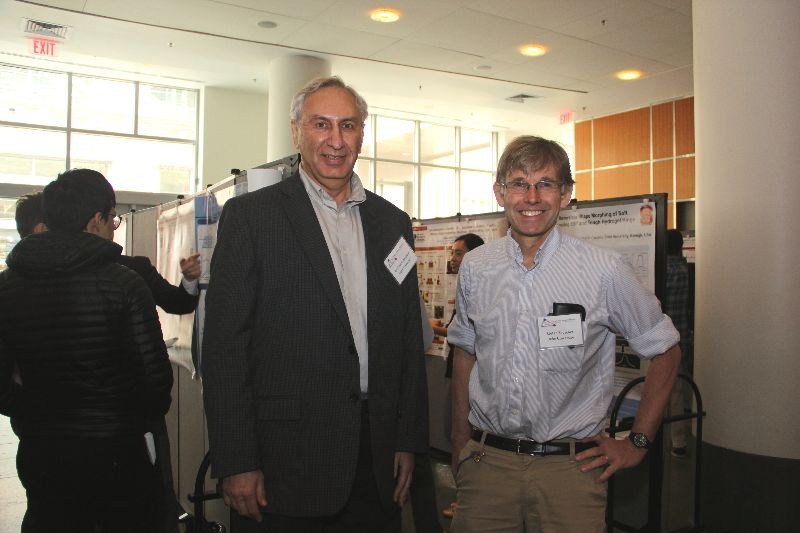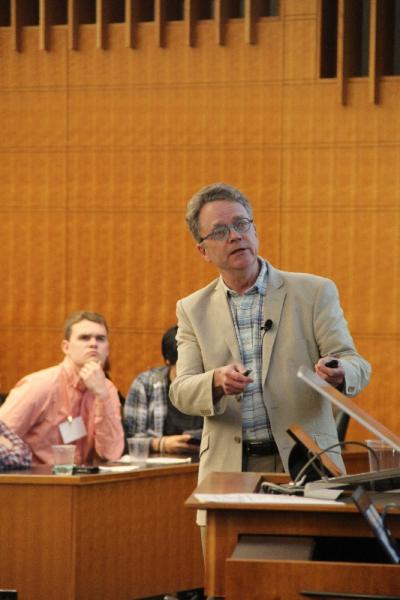Triangle Soft Matter Workshop Continues to Grow
Annual workshop has helped establish NC's Research Triangle Region as a destination for soft matter research

Eleven years ago, world-renowned soft matter expert Michael Rubinstein—now a professor of mechanical engineering and materials science, biomedical engineering, chemistry and physics at Duke University—invited colleagues to convene at the first annual Triangle Soft Matter Workshop, where they would present new ideas, meet new collaborators, and generally strengthen and support the field as it grew.
As it begins its second decade, it’s safe to call the workshop a roaring success. The honor of hosting the annual workshop rotates among UNC-Chapel Hill, NC State University, and Duke, and the team effort has helped establish the Research Triangle region of North Carolina as a global center for soft matter research. This year’s workshop, hosted by Duke, was the largest to date, with over 150 attendees.
“Every year, you see cross-germination of ideas and new collaborative possibilities coming out of this workshop in ways that drive important science forward.”
Stephen Craig
William T. Miller Professor of Chemistry at Duke
“The growing attendance of the Triangle Soft Matter Workshop is due to both the success of this forum and to increasing activity in soft matter at Triangle universities,” said Rubinstein, who also led the establishment of the interdisciplinary Duke Soft Matter Center in 2018.

Rubinstein organized the event alongside Duke chemistry professor Stephen Craig and Duke mechanical engineering and materials science professor Stefan Zauscher.
The three curated an agenda brimming with top names in soft matter: UNC’s Ronit Freeman, Duke’s Kevin Welsher, and NC State’s Ashley Brown presented their research, while the University of Minnesota’s Timothy Lodge gave the plenary lecture, titled “Equilibration and Dynamics in Block Copolymer Micelles.”

Lodge is spending part of a sabbatical year at Duke, where he is working closely with Rubinstein. “My own group does experiments, and we have generated a body of interesting results on the dynamics of self-assembly,” said Lodge. “Professor Rubinstein and I have been working on ideas that might be able to explain some of our most puzzling experimental results.”
Students and postdocs were invited to present two-minute “sound bites” of their own research at the workshop, and to follow up in greater detail via a poster presentation and competition in the atrium of Fitzpatrick CIEMAS. More than eighty students participated—including many from Duke’s recently established University Program in Materials Science and Engineering, as well as from UNC and NC State. UNC’s Andrew Keith took first place for his poster, titled “Brush-like Architectures: Programmable Design of Physical Properties.”
“The sound bites are the most interesting and diverse sessions of the workshop,” said Rubinstein. “They showcase the whole spectrum of soft matter research at local universities.”
Craig stressed that the field of soft matter isn’t just for engineers. “What always strikes me about this workshop is how interdisciplinary the field of soft matter is, and how groups from Chemistry, Physics, and Engineering are together tackling important problems ranging from biophysics to new classes of adaptive synthetic materials,” said Craig. “Every year, you see cross-germination of ideas and new collaborative possibilities coming out of this workshop in ways that drive important science forward.”
